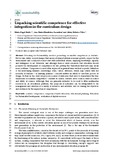Mostrar el registro sencillo del ítem
Unpacking scientific competence for effective integration in the curriculum design
| dc.creator | Napal Fraile, María | es_ES |
| dc.creator | Mendioroz Lacambra, Ana | es_ES |
| dc.creator | Peñalva Vélez, Alicia | es_ES |
| dc.date.accessioned | 2019-11-29T18:20:29Z | |
| dc.date.available | 2019-11-29T18:20:29Z | |
| dc.date.issued | 2019 | |
| dc.identifier.uri | https://hdl.handle.net/2454/35470 | |
| dc.description.abstract | Educating for Sustainability involves promoting sustainable competences in students. Not in vain, wider societal changes that ensure a balance between economic growth, respect for the environment and social justice must start with individual actions, implying knowledge, capacity and willingness to act. However, and although there is wide consensus that education should promote the development of competences for life, putting this theoretical tenet into may entail more problems. Competence is most often expressed in general terms without a specific definition of the intervening elements (knowledge, skills, values, attitudes), which may collide with the necessity of teachers – as learning planners - concrete entities on which to base their process of design. So that, in this work we propose a series of indicators that serve to characterize the four dimensions of scientific competence – contents of science, contents about science, value of science and utility of science-. Although they are primarily intended to be used to filter multimedia resources in an educational platform, this proposal of indicators can be extrapolated to the management and selection of a variety of resources and activities, and for sharing the objectives and evidences for the acquisition of competencies. | en |
| dc.description.sponsorship | This research was funded by Department of Education, Gobierno de Navarra, grant number 334 0011-1365-2018-000124 and The APC was funded by grant number 0011-1365-2018-000124. | en |
| dc.format.extent | 12 p. | |
| dc.format.mimetype | application/pdf | en |
| dc.language.iso | eng | en |
| dc.rights | © 2019 by the authors. Submitted for possible open access publication under the terms and conditions of the Creative Commons Attribution (CC BY) license. | en |
| dc.rights.uri | http://creativecommons.org/licenses/by/4.0/ | |
| dc.subject | Scientific competence | en |
| dc.subject | Competence-based education | en |
| dc.subject | Educational planning | en |
| dc.subject | Education for sustainable development | en |
| dc.subject | Evaluation of digital resources | en |
| dc.title | Unpacking scientific competence for effective integration in the curriculum design | en |
| dc.type | Artículo / Artikulua | es |
| dc.type | info:eu-repo/semantics/article | en |
| dc.contributor.department | Ciencias | es_ES |
| dc.contributor.department | Zientziak | eu |
| dc.contributor.department | Ciencias Humanas y de la Educación | es_ES |
| dc.contributor.department | Giza eta Hezkuntza Zientziak | eu |
| dc.rights.accessRights | Acceso abierto / Sarbide irekia | es |
| dc.rights.accessRights | info:eu-repo/semantics/openAccess | en |
| dc.type.version | Versión enviada / Bidali den bertsioa | es |
| dc.type.version | info:eu-repo/semantics/submittedVersion | en |
| dc.contributor.funder | Gobierno de Navarra / Nafarroako Gobernua, 334 0011-1365-2018-000124 | es |



